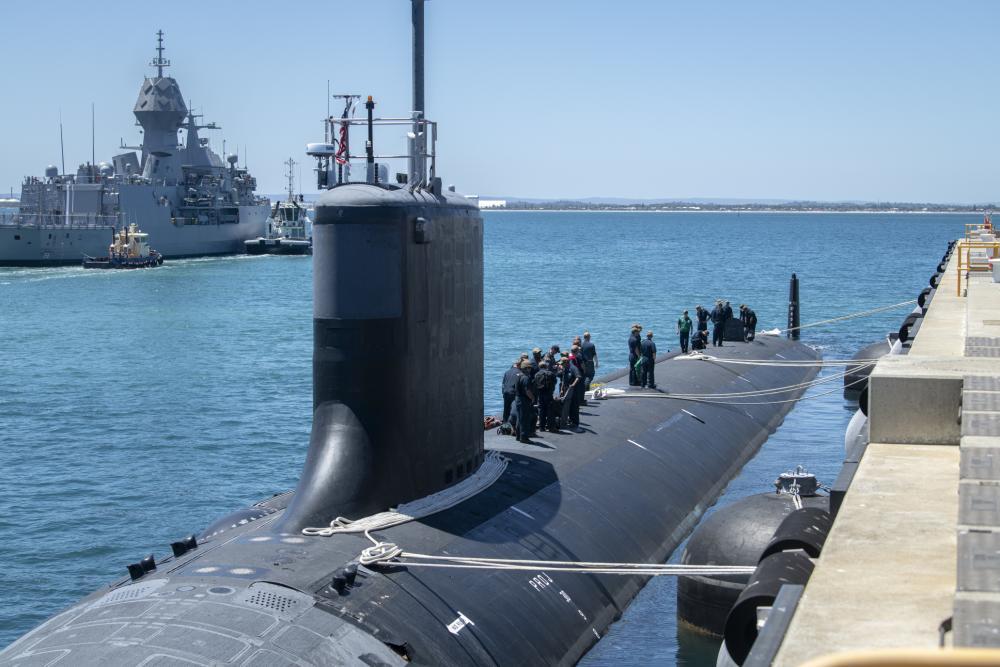
Sea state
It will be several years before Australia receives its first nuclear-powered submarines under the ‘SSN AUKUS’ deal announced this week, but planning is already underway to develop a submarine ‘hub’ in Australia that will enable activities ranging from boat repairs and maintenance to construction and support for missions. The submarine acquisition is intended to provide Australia with a strong deterrent capability in the face of a declining strategic situation in the region and China’s growing assertiveness. The agreement also reflects a US strategic realignment to bolster its allies, redeploy resources and incorporate partners into its supply chains and industrial planning.
China has vehemently criticised the pact as a US-led endeavour to constrain its power and President Xi Jinping has vowed to build the People’s Liberation Army into a ‘great wall of steel’ to safeguard China’s sovereignty, security, and development interests. Some commentators have dismissed Beijing’s objections in light of its own commissioning of large numbers of nuclear-powered submarines, some equipped with nuclear-tipped intercontinental ballistic missiles.
Russia is set to arm several of its warships with long-range Kalibr cruise missiles and anti-submarine torpedoes. The vessels include the Lada-class submarine Kronstadt, the corvette Steregushchiy and the nuclear missile cruiser Admiral Nakhimov. The Kalibr land attack missiles were used by Russia in attacks on Ukraine in February. They can also be used to hit targets at sea, including submarines.
Flight path
Deputy Prime Minister Richard Marles has announced that the Royal Australian Air Force will reactivate its 9 Squadron after 34 years to operate the three MQ-4C Triton uncrewed aircraft it has on order. The first Triton is expected to be delivered to the RAAF in 2024. A high-altitude system that can fly for up 24 hours, the Triton will enhance the RAAF’s maritime surveillance capabilities, at a time when maritime security in the Indo-Pacific is an increasing concern.
The defence chiefs of Australia and Papua New Guinea have signed a memorandum of understanding and implementing arrangement covering Australia’s delivery of two multi-role PAC-750XL aircraft to PNG . The aircraft, provided as a part of the joint ‘flights of excellence’ program, will bolster the PNG Defence Force’s ability to respond to national and regional incidents. It will also expand defence cooperation and joint training opportunities as set out in the recent bilateral security agreement and at the Australia–Papua New Guinea Ministerial Forum.
Rapid fire
BAE Systems Australia has signed an industrial collaboration agreement with European missile group MBDA to build on efforts to establish domestic production under Australia’s guided weapons and explosive ordnance program. The industrial collaboration will focus on co-development of weapons systems and establishment of a skills and capability initiative to increase Australia’s attractiveness as a reliable industrial base open to foreign industry.
The US State Department has approved Australia’s request to purchase 255 Javelin FGM-148F anti-tank guided missiles and related equipment under a foreign military sales agreement worth US$60.18 million. The package includes technical assistance and other logistical and program support services. In notifying Congress of the possible sale, the Defense Security Cooperation Agency stated that it would expand the Australian Army’s anti-armour capability and capacity to meet current and future threats.
Final frontier
The Australian Space Agency has entered into a memorandum of understanding with the Defence Aviation Safety Authority to align civil and military regulation of space activities. Signed at this year’s Avalon Airshow, the agreement’s goal is for space to be regulated as a critical domain through cooperation with civil society. It comes a little over a year after the establishment of the Defence Space Command.
The US has announced that the second stage of China’s Chang Zheng 2D rocket disintegrated over the US mainland. The rocket’s re-entry was uncontrolled, meaning that it was not steered but fell after its orbit decayed. This occurred amid longstanding criticism of China over the uncontrolled re-entry of its rocket debris. Last year, it was initially projected that debris from a rocket launched from China’s Hainan Island would hit Australia, although it ultimately landed in the sea.
Wired watchtower
The White House has released a new national cybersecurity strategy intended to defend critical infrastructure, disrupt and dismantle threat actors, shape market forces to drive security and resilience, and invest in a resilient future. More precise guidance on how the Pentagon will conduct offensive cyber operations against state and non-state threats is expected when its updated ‘zero-trust strategy’ is unveiled in the coming weeks.
The Pentagon is seeking US$13.5 billion for its cyber activities, according to fiscal year 2024 budget documents. The investment blueprint is a 20.5% increase over the previous fiscal year. The funding will go towards safeguarding Department of Defense information networks, modernising cyber protection standards for the defence industrial base, and supporting training efforts. The request also provides the commander of US Cyber Command enhanced authority over a US$3 million budget to train and equip the joint cyber force.